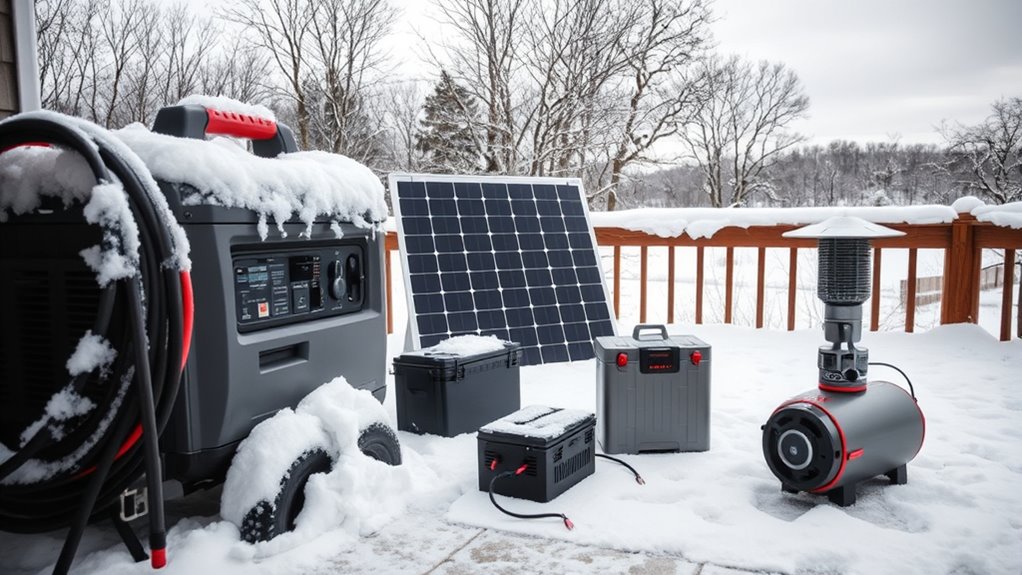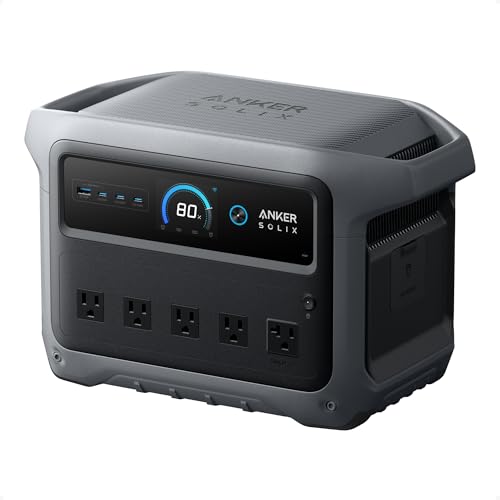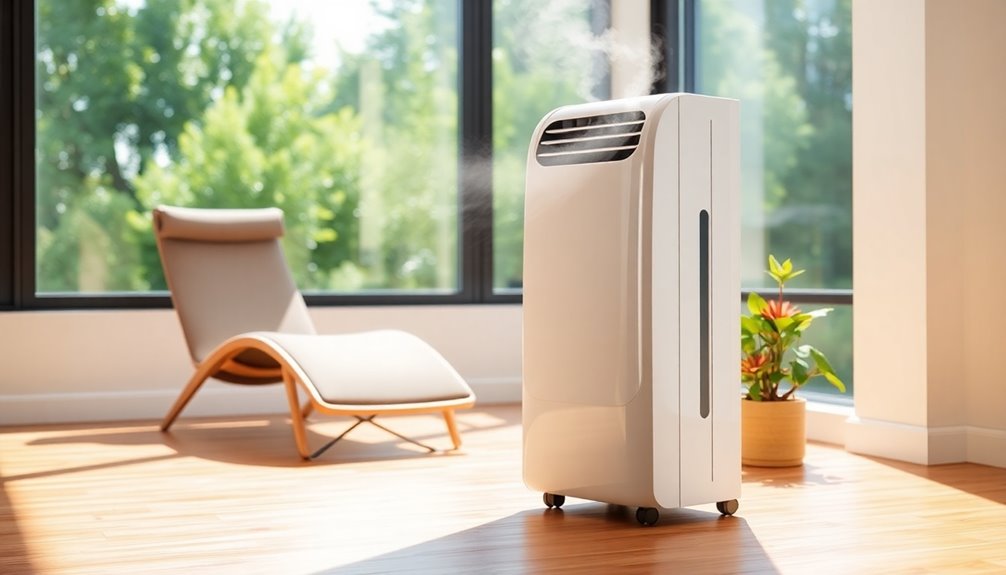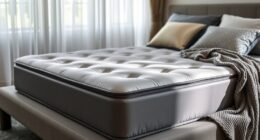If you’re looking to keep your home powered during winter outages, I recommend exploring portable power stations like the Jackery Explorer 300, EcoFlow Delta Pro, and the BROWEY 1600W, which offer great capacity, portability, and flexibility with solar, AC, or fuel charging. There are also compact units like the MARBERO 88Wh for small devices and high-capacity options for whole-home backup. Keep in mind essential features and compatibility—staying prepared is easier than you think if you consider these options. If you continue, you’ll discover even more effective alternatives.
Key Takeaways
- Portable power stations offer lightweight, versatile backup options for small devices, camping, and short-term emergencies during winter.
- High-capacity battery systems like EcoFlow 12kWh and Delta Pro can power whole homes or essential appliances during extended outages.
- Multiple recharging methods, including solar, AC, and car charging, ensure reliable power replenishment in winter conditions.
- Understanding power output and device compatibility helps select suitable units for appliances, electronics, and medical equipment.
- Compact, durable units with safety features and quick recharge capabilities are ideal for winter emergencies and outdoor activities.
MARBERO Portable Power Station 88Wh Camping Lithium Battery Solar Generator
If you’re looking for a compact and reliable backup power source for winter emergencies, the MARBERO Portable Power Station 88Wh is an excellent choice. It offers efficient charging and versatile power options, making it perfect for outdoor camping, home backup, or on-the-go needs. Weighing just 3.2 pounds and fitting in a backpack, it’s highly portable. With 8 output ports, it can charge multiple devices simultaneously, including phones, tablets, and small appliances. Its compatibility with solar panels ensures renewable charging, and the built-in safety features protect against overloads and short circuits. It’s a dependable, easy-to-carry power solution for winter preparedness.
Best For: outdoor enthusiasts, emergency preppers, and anyone needing portable power for camping, home backup, or on-the-go device charging.
Pros:
- Compact and lightweight design weighing only 3.2 lbs, easy to carry and store
- Multiple output ports (USB, USB-C, AC, DC) for simultaneous device charging
- Supports solar charging for renewable, eco-friendly energy sources
Cons:
- Limited capacity of 88Wh may not power larger appliances for extended periods
- Charging from 0 to 80% takes approximately 2 hours, which may be slow for some users
- Built-in LED flashlight, while useful, has limited brightness and duration
Jackery Portable Power Station Explorer 300
The Jackery Portable Power Station Explorer 300 is an ideal choice for outdoor enthusiasts and those facing power outages who need reliable, portable energy. Weighing just 7.1 pounds, it’s perfect for camping, travel, or emergency backup. Its 293Wh lithium-ion battery recharges quickly—80% in 2 hours—and can be topped up via wall outlet, car, or solar panel (like the SolarSaga 100). It supports up to six devices simultaneously, including laptops, cameras, and drones, with pure sine wave outlets ensuring safe, stable power. Compact and versatile, it’s a dependable solution when you need power on the go or during winter outages.
Best For: outdoor enthusiasts, campers, and those needing reliable backup power during outages or off-grid adventures.
Pros:
- Lightweight and portable at just 7.1 pounds, ideal for travel and outdoor activities.
- Rapid recharge capability—80% in 2 hours via wall outlet or PD USB-C port.
- Supports up to six devices simultaneously with pure sine wave outlets for safe power delivery.
Cons:
- Solar panel not included, requiring an additional purchase for solar charging.
- Limited to 293Wh capacity, which may not power larger appliances for extended periods.
- Only two AC outlets, restricting the number of high-power devices that can be used simultaneously.
Jackery Explorer 240D Portable Power Station
For anyone seeking a lightweight, reliable backup power option during winter emergencies, the Jackery Explorer 240D Portable Power Station stands out. It features a 256Wh LiFePO4 battery, equivalent to eight standard power banks, and delivers a steady 200W pure DC output. With three USB-C ports and one USB-A, it can power laptops, smartphones, tablets, drones, and even Starlink Mini. Weighing only 4.85 lbs, it’s about 46% lighter and 70% smaller than similar units, making it perfect for camping or travel. Its fast charging options—including solar, car, and AC—ensure you stay powered up, rain or shine, for up to 10 hours on high-demand devices.
Best For: outdoor enthusiasts, campers, and emergency preparedness individuals seeking a lightweight, reliable backup power source for small to medium devices.
Pros:
- Ultra-lightweight and compact design, weighing only 4.85 lbs for easy portability
- Fast charging capabilities via solar, car, and AC-DC dual input options
- Long-lasting LiFePO4 battery with a 10-year lifespan and over 6,000 charge cycles
Cons:
- Limited to 200W pure DC output, which may not support higher-wattage appliances
- Only four ports, which might be insufficient for multiple device charging simultaneously
- No built-in AC outlet, restricting direct AC power output
Jackery Solar Generator 1000 v2 with Solar Panel
When preparing for winter outages, reliable power sources become essential, and the Jackery Solar Generator 1000 v2 with Solar Panel stands out with its long-lasting LiFePO4 battery and fast-charging capabilities. It features a 1,070Wh capacity with a 10-year lifespan and over 4,000 charge cycles, maintaining over 70% capacity. The unit delivers a 1,500W AC output, enough to power appliances like fridges and small heaters. Weighing only 23.8 pounds, it’s portable and easy to handle. Its advanced ChargeShield 2.0 technology guarantees safe, quick charging, while multiple ports support simultaneous device use, making it a versatile backup during winter emergencies.
Best For: outdoor enthusiasts, RV travelers, and emergency preparedness individuals seeking a reliable, portable power solution with long battery life and fast charging capabilities.
Pros:
- Long-lasting 1,070Wh LiFePO4 battery with over 4,000 charge cycles and 10-year lifespan
- Fast charging from 0% to 100% in about one hour using emergency mode, with multiple ports for versatile device charging
- Lightweight and portable at only 23.8 pounds with a foldable handle, suitable for various outdoor and emergency scenarios
Cons:
- Solar panel and generator are shipped separately, requiring additional setup time
- Limited to a 1500W continuous output, which may not power larger high-wattage appliances
- The product may be relatively higher priced compared to smaller or less advanced portable power stations
Anker SOLIX C1000 Gen 2 Portable Power Station
If you’re looking for a reliable backup power solution during winter outages, the Anker SOLIX C1000 Gen 2 Portable Power Station stands out with its impressive 2000W continuous output and fast recharge capabilities. Its 1024Wh LiFePO4 battery supports up to 10 devices simultaneously, making it perfect for emergency backup, remote work, or off-grid living. With HyperFlash technology, it recharges fully in just 49 minutes, and solar recharging takes only 1.8 hours with 600W input. Its compact, lightweight design is easy to carry and durable enough for daily use, ensuring you stay powered during the coldest months.
Best For: those seeking a reliable, portable backup power source for emergencies, off-grid living, or remote work during winter outages.
Pros:
- High continuous power output of 2000W with peak of 3000W, suitable for various appliances and devices
- Fast recharge time of just 49 minutes with HyperFlash technology and solar recharging in 1.8 hours
- Compact, lightweight, and durable design ideal for portability and daily use in diverse environments
Cons:
- Relatively high initial cost compared to smaller or less feature-rich power stations
- May require specific solar panels (600W input) for optimal solar recharging setup
- Limited to 10 device connections simultaneously, which might be restrictive for larger setups
EF ECOFLOW Portable Power Station DELTA 2, 1024Wh LiFePO4 Battery
The EF ECOFLOW Portable Power Station DELTA 2 stands out as an excellent choice for winter backup power because its 1024Wh LiFePO4 battery offers reliable, long-lasting energy that can be expanded up to 3kWh. It supports fast charging—80% in just 50 minutes—and can be recharged via AC or solar panels up to 500W. With 1800W AC output and 15 outlets, it can power most household appliances quietly and fumes-free. Its LiFePO4 chemistry guarantees over 3000 charge cycles, making it durable for long-term use. Compact and portable, it’s perfect for home backup, camping, RVs, or off-grid living during the cold months.
Best For: those seeking a reliable, portable power solution for home backup, camping, RVs, or off-grid living during winter months.
Pros:
- Rapid charging capability: 0-80% in 50 minutes, ensuring quick readiness.
- Expandable capacity up to 3kWh for versatile energy needs.
- Long-lasting LiFePO4 chemistry with over 3000 charge cycles, ensuring durability.
Cons:
- Limited solar input capacity of 500W may require multiple panels for faster charging.
- Heavier and bulkier compared to smaller portable power units.
- Higher initial cost compared to traditional lead-acid battery systems.
WEN 3600-Watt Dual Fuel Portable Inverter Generator
The WEN 3600-Watt Dual Fuel Portable Inverter Generator stands out as an ideal choice for those seeking a quiet, reliable power source during winter outages, especially since it offers the flexibility to run on both gasoline and propane. It’s lightweight, RV-ready, and features a fuel shut-off for easy maintenance. With an extremely quiet operation comparable to normal conversation, it produces clean power safe for sensitive electronics. Safety is prioritized with the CO watchdog sensor that automatically shuts down the generator if dangerous carbon monoxide levels are detected. Equipped with multiple outlets, including USB ports, it’s a versatile, convenient backup option for winter emergencies.
Best For: homeowners and RV enthusiasts seeking a quiet, versatile, and reliable portable power source for winter outages and outdoor activities.
Pros:
- Operates on both gasoline and propane for flexible fuel options
- Extremely quiet operation comparable to normal conversation
- Produces clean power safe for sensitive electronics and equipped with safety features like CO watchdog sensor
Cons:
- Might be heavier than smaller portable generators, affecting portability
- Requires proper handling and maintenance of dual fuel systems
- Limited runtime depending on fuel tank size and load conditions
Anker Portable Power Station SOLIX C300, 288Wh Solar Generator
Looking for a reliable backup power source that’s portable and quiet? The Anker SOLIX C300 fits the bill perfectly. It’s compact, lightweight at just over 9 pounds, and features a rugged, impact-resistant design, making it easy to carry on outdoor trips or during emergencies. With a 288Wh LiFePO4 battery, it delivers 300W continuous power and supports multiple devices via 8 versatile ports, including AC, USB-C, and USB-A. Recharging is quick—80% in 50 minutes—and it’s compatible with solar panels for eco-friendly energy. Operating at just 25dB, it’s silent enough not to disturb your surroundings while providing dependable power when you need it most.
Best For: outdoor enthusiasts, travelers, and emergency preparedness individuals seeking a portable, quiet, and reliable power source.
Pros:
- Compact, lightweight design weighing just over 9 pounds for easy portability
- Versatile charging options with 8 ports including AC, USB-C, and USB-A
- Quiet operation at only 25dB, suitable for outdoor and indoor use without disturbance
Cons:
- Not compatible with Anker SOLIX PS30, PS200, or PS400 solar panels
- Limited continuous power output of 300W, which may not suffice for high-power devices
- Recharge time of 50 minutes to 80% may be insufficient for rapid consecutive recharges during extended use
Portable Power Station 300W 257Wh Lithium Battery Bailibatt
If you need a lightweight, portable power solution that can keep your essential devices running during winter emergencies or outdoor trips, the BailiBatt Portable Power Station 300W is an excellent choice. Weighing just 4.6 pounds, it’s easy to carry and perfect for camping, travel, or backup power at home. With a 257Wh lithium battery and a 69,600mAh capacity, it supports charging laptops, smartphones, tablets, and cameras simultaneously. Equipped with dual 120V AC outlets and DC ports, it delivers stable power for sensitive electronics. The built-in BMS system guarantees safety, while the LCD screen keeps you informed of real-time status.
Best For: outdoor enthusiasts, campers, and emergency preparedness individuals seeking a lightweight, reliable power solution for portable device charging and small electronics.
Pros:
- Lightweight and compact at only 4.6 pounds, easy to carry for outdoor and travel use
- Supports multiple devices simultaneously with dual 120V AC outlets and DC ports
- Built-in BMS ensures safety and supports over 1500 charge cycles for long-term use
Cons:
- Does not include a car charger cable or solar charging accessories, limiting charging options off-grid
- Limited to a maximum 300W load, unsuitable for high-power appliances
- Requires manual activation of AC outlets by pressing and holding the power button for three seconds
EF ECOFLOW 12kWh Power Station with Extra Battery
When winter storms threaten power outages, the EF ECOFLOW 12kWh Power Station with Extra Battery stands out as an excellent backup option for those needing reliable, long-lasting energy. It supports 120/240V AC output and delivers up to 7200W, expandable to 90kWh with additional batteries, making it capable of running heavy household appliances like central air conditioning. With a base 6144Wh battery, it can last for days, and its smart system helps prioritize circuits via the EcoFlow app. Supporting solar, AC, and portable charging, it offers flexible, off-grid power. Despite its weight of nearly 300 pounds, its expandable capacity and robust performance make it a top winter backup choice.
Best For: homeowners, campers, and emergency preparedness enthusiasts seeking reliable, long-lasting backup power capable of running heavy household appliances during outages.
Pros:
- Supports 120/240V AC output with a robust 7200W power capacity, expandable to 90kWh for extended use
- Compatible with solar, AC, and portable charging sources for flexible off-grid energy solutions
- Can operate multiple heavy appliances simultaneously, including central air conditioning, thanks to its high inverter capacity and expandable design
Cons:
- Weighs nearly 300 pounds, making it less portable and more challenging to move frequently
- Higher initial cost due to advanced features and expandable capacity
- Complex setup and maintenance may require technical knowledge or assistance
Portable Power Station 300W with Solar Generator and Lithium Battery
The Portable Power Station 300W with Solar Generator and Lithium Battery stands out as an ideal backup for winter emergencies thanks to its compact design and versatile charging options. Weighing just 7.3 pounds, it’s perfect for camping, travel, or home backup. It offers 230.88Wh capacity, supporting devices like laptops, phones, lights, fans, and small refrigerators. With six outlets—including AC, USB-C PD 60W, and car ports—it handles multiple devices simultaneously. The upgraded lithium battery and advanced BMS ensure safety, while support for solar, AC, or car charging makes it highly efficient. Its quick-charging USB-C and fast-charging ports make powering up quick and easy during winter outages.
Best For: outdoor enthusiasts, travelers, and homeowners seeking a reliable, portable backup power solution for emergencies, camping, or travel.
Pros:
- Compact and lightweight at only 7.3 pounds, making it easy to carry and transport.
- Supports multiple devices simultaneously with versatile outlets, including fast-charging USB-C PD 60W.
- Equipped with advanced BMS and dual cooling fans ensuring safety, durability, and efficient operation.
Cons:
- Limited capacity of 230.88Wh may not power larger appliances for extended periods.
- Maximum continuous output of 330W might restrict usage with higher-wattage devices.
- Requires multiple charging methods; solar charging depends on sunlight availability for optimal performance.
HOWEASY Portable Power Station with 110V AC, DC, USB, LED Light, 88Wh Battery
The HOWEASY Portable Power Station stands out as an ideal backup solution for outdoor enthusiasts and emergency preppers alike, thanks to its compact design and versatile output options. With 120W (240W peak) power and an 88Wh lithium battery, it can charge devices like laptops, phones, and small appliances. Its eight output ports include AC, USB-C, USB, and DC, providing flexibility for various devices. Weighing just 2.3 pounds and measuring 6.6 x 4 x 3 inches, it’s highly portable. The built-in LED light offers multiple modes, making it perfect for camping, emergencies, or power outages, ensuring you stay connected and safe.
Best For: outdoor enthusiasts, emergency preppers, and anyone needing portable power for devices during outdoor activities or power outages.
Pros:
- Compact and lightweight design (6.6 x 4 x 3 inches, 2.3 pounds) for easy portability
- Multiple output options including AC, USB-C, USB, and DC ports for versatile device charging
- Built-in LED light with steady, flashing, and SOS modes for emergency illumination
Cons:
- 88Wh battery capacity may be insufficient for high-power or long-duration use
- Recharging options require additional accessories like solar panels (not included) or car chargers
- Limited peak power (240W) may not support larger appliances or high-wattage devices
Portable Power Station 600W with 293Wh Lithium Battery
A portable power station with a 600W output and a 293Wh lithium battery is an ideal choice for anyone needing reliable backup power during winter storms or outages. It delivers a pure sine wave AC output supporting most appliances up to 600W, with a surge capacity of 1200W. Its versatile design includes multiple charging ports—USB-C, fast-charging USB, car, and DC—making it perfect for laptops, cameras, and small devices. Weighing only 7.7 pounds, it’s portable enough for outdoor use or emergency situations. The built-in BMS guarantees safety, while the LCD screen provides real-time status updates, making it a practical winter backup solution.
Best For: outdoor enthusiasts, emergency preparedness, and anyone needing portable backup power during outages or outdoor activities.
Pros:
- Compact and lightweight at only 7.7 pounds, easy to carry and transport.
- Multiple versatile charging ports including USB-C, fast-charging USB, car, and DC, suitable for various devices.
- Reliable safety features with built-in BMS and real-time LCD monitoring for peace of mind.
Cons:
- Limited total capacity of 293Wh may require frequent recharging for extended use.
- Does not include a car charger cable, which may require additional purchase.
- Supports appliances up to 600W, so higher wattage devices cannot be powered.
BROWEY 1600W Portable Power Station with Solar Panel
If you’re searching for a reliable backup power source that combines portability with high capacity, the BROWEY 1600W Portable Power Station with Solar Panel is an excellent choice for winter emergencies. It features a robust 1024Wh LiFePO4 battery, providing 1600W continuous power and 3200W peak, enough to run appliances like refrigerators and CPAP machines. Its innovative design, awarded the iF Design Award 2022, includes a built-in solar panel with MPPT controller for faster solar charging. With multiple ports—AC, DC, USB-C PD 100W—it supports various devices. Safe, durable, and versatile, it’s perfect for off-grid use, outdoor adventures, or during power outages.
Best For: outdoor enthusiasts, emergency preparedness, and off-grid living who need a reliable, high-capacity portable power solution.
Pros:
- High capacity with 1024Wh LiFePO4 battery and 1600W continuous power output, suitable for multiple devices.
- Recognized for innovative design with an iF Design Award 2022, combining portability and high performance.
- Supports fast solar charging and multiple device connections via various ports including USB-C PD 100W.
Cons:
- Relatively heavy and bulky for some users to carry easily.
- May require additional solar panels for optimal off-grid charging, increasing overall setup cost.
- Limited to a maximum of 80% charge in around 3 hours via AC and USB-C simultaneously, which might be slow for urgent needs.
EF ECOFLOW Delta Pro 4096Wh Power Station with Dual Fuel Generator
When preparing for winter outages, reliable backup power becomes essential, especially for those needing to run multiple home appliances or stay connected during extended emergencies. The EF ECOFLOW Delta Pro 4096Wh Power Station paired with the Dual Fuel Generator offers a versatile, portable solution. It features a massive 4096Wh battery, expandable to 48kWh, and supports seven charging methods including solar, gas, and AC. The dual fuel generator supports LPG and gasoline, providing up to 24kWh with propane. With real-time safety monitoring via the EcoFlow app, automatic shutdowns protect your system. Weighing 115 pounds, it’s ideal for whole-home backup, camping, or RV use during harsh winter conditions.
Best For: homeowners, campers, and RV users seeking reliable, portable backup power for extended outages or outdoor adventures during harsh winter conditions.
Pros:
- High-capacity 4096Wh expandable battery ideal for whole-home backup and extended power needs
- Supports seven versatile charging methods including solar, gas, and AC for flexible recharging
- Equipped with real-time safety monitoring via EcoFlow app, ensuring automatic shutdowns for protection
Cons:
- Heavy weight of 115 pounds may require assistance for transport
- Longer setup time when expanding battery capacity with additional units
- Price may be relatively high for budget-conscious consumers
Factors to Consider When Choosing a Winter Backup Generator Alternative

When selecting a winter backup generator, I focus on how much power I need and which fuel options work best for me. I also consider if the unit is portable enough to move easily and how long it can run without refueling. Finally, I look at how well it handles cold conditions and how quickly it can recharge for reliable, ongoing backup power.
Power Capacity Needs
Choosing the right winter backup generator starts with understanding your power capacity needs. I recommend listing all essential appliances and devices you want to run during an outage, then calculating their total wattage. Be sure to consider both starting and running wattages, as some devices draw more power when they start up. Think about whether you need a portable or stationary model based on your capacity needs and where you’ll use it. It’s smart to plan for future needs by selecting a generator with a higher capacity than your current essentials. Matching the generator’s continuous wattage output to your combined load is vital to avoid overloads and ensure reliable operation. Proper sizing guarantees your home stays powered without interruptions during the cold season.
Fuel Type Options
Selecting the right fuel type for your winter backup generator depends on several practical factors. Gasoline generators are common but need regular refueling and have a limited shelf life without stabilizers, which can be a hassle during extended outages. Propane offers cleaner emissions and longer storage, making it ideal for long-term use and less maintenance. Natural gas generators connect directly to your home’s utility line, providing continuous fuel without needing refills, but they rely on utility availability, which can be disrupted during severe weather. Dual-fuel models give you the flexibility to switch between fuels, reducing the risk of running out of power. Considering your storage options, fuel availability, and long-term needs will help you choose the best fuel type for winter backup power.
Portability and Size
Portability and size are crucial factors to contemplate because a generator that’s too bulky or heavy can be difficult to move and store, especially during emergencies. I recommend considering the weight and dimensions to guarantee it fits comfortably in your available space. Compact designs that can slide into vehicle trunks, closets, or sheds without sacrificing power are ideal. Look for models with ergonomic handles or wheels—they make relocating the generator effortless across different terrains or indoor areas. Smaller, lightweight units are perfect if you need frequent mobility, while larger models might require assistance or extra lifting. Most importantly, make sure the size aligns with your backup power needs to avoid unnecessary bulk or hassle, ensuring you can store and deploy it quickly when you need it most.
Run Time Durability
When it comes to guaranteeing your winter backup generator keeps running through prolonged outages, run time durability becomes a top priority. I look for models with high-capacity fuel tanks or long-lasting batteries to ensure extended operation during power outages. The engine or battery system must be durable enough to withstand cold temperatures and frequent use without degrading. Efficient fuel consumption or advanced battery management helps maximize runtime on limited resources, which is critical during winter storms. I also consider generators with automatic shutoff and safety features that prevent damage and ensure consistent performance over multiple seasons. Ideally, a dependable backup generator should operate continuously for 8 to 12 hours or more, providing peace of mind when the power stays out for an extended period.
Charging and Recharging
To make certain your winter backup generator stays ready when you need it most, paying close attention to its charging and recharging capabilities is essential. Look for models that support fast recharging methods like AC wall outlets, solar panels, or vehicle chargers, so you can quickly restore power during outages. Check the battery capacity and cycle lifespan to ensure reliable operation over time without frequent recharges. If considering solar recharging, verify compatibility with solar panels and the presence of MPPT technology for maximum efficiency. Aim for a charging time that reaches at least 80% capacity within 2-3 hours to minimize downtime. Additionally, prioritize safety features like overcharge protection and temperature regulation to keep the process safe and efficient.
Noise Levels Impact
Choosing a backup generator that operates quietly can make a substantial difference during winter outages, especially if you’ll be running it indoors or overnight. Low noise levels help maintain a peaceful environment and prevent disturbances to your family, neighbors, and pets. Generators producing less than 60 decibels are generally considered quiet enough for residential use, making them ideal for extended or overnight operation. Excessive noise can cause stress and discomfort, turning what should be a practical solution into a source of frustration. Some portable models feature sound-dampening technology that reduces noise by up to 50%, considerably improving comfort and neighbor relations. When selecting a generator, prioritize models with lower decibel ratings to ensure a quieter, more pleasant experience during harsh winter outages.
Safety and Protections
Ensuring safety and protection features are integral when selecting a winter backup generator, especially since it will likely operate in challenging conditions. I look for models with built-in Battery Management Systems (BMS) to guard against overvoltage, overcurrent, and short circuits, providing peace of mind. Automatic shutoff features are essential to prevent overheating and overloads during extended use, ensuring safe operation. I also prioritize generators with surge protection and thermal regulation to shield connected devices from power fluctuations and extreme temperatures. Indicator lights and safety alerts help me stay aware of potential electrical or thermal issues, allowing quick response. Ultimately, I verify that the generator meets safety standards and certifications, guaranteeing reliable protection when it’s needed most in winter emergencies.
Cost and Budget
Have you ever considered how your winter backup generator fits into your overall budget? It’s crucial to determine your total power needs during outages to set a realistic budget. Think about the upfront costs, including purchase price, installation, fuel, and maintenance. Don’t forget to assess long-term expenses like fuel consumption and parts replacement, which impact affordability over time. Striking a balance between initial investment and features helps you avoid overspending on unnecessary capacity or durability. Research financing options, discounts, or rebates that could offset costs and make your choice more budget-friendly. By understanding both the short-term and ongoing expenses, you can select a backup generator that provides reliable power without straining your finances.
Frequently Asked Questions
How Long Can Portable Power Stations Operate During Winter Outages?
Portable power stations can typically run between 4 to 12 hours during winter outages, depending on their capacity and the devices you power. I’ve found that smaller models last shorter, while larger ones with higher wattage can keep essential appliances running longer. To maximize their runtime, I prioritize energy-efficient devices and limit usage. Always check the wattage and battery capacity to estimate how long your station can support your needs during a winter outage.
Are Solar Generators Effective in Snowy or Cloudy Winter Conditions?
Think of solar generators as the sun’s loyal messengers—sometimes they deliver, sometimes they’re delayed. In snowy or cloudy winter conditions, they can still work, but they’re less reliable since clouds and snow block sunlight. I’ve found they perform best on clear winter days, but don’t count on them during heavy storms or thick clouds. They’re a helpful backup, yet not a foolproof solution for harsh winter weather.
What Safety Precautions Are Needed for Indoor Use of Portable Generators?
I always guarantee proper safety when using portable generators indoors. I keep them in well-ventilated areas to prevent carbon monoxide buildup, never run them near windows or vents, and use carbon monoxide detectors in my home. I also keep a fire extinguisher nearby, avoid overloading the generator, and regularly inspect cords and connections. Following these precautions helps me protect my family while staying powered during winter outages.
Can Portable Power Stations Power All Essential Home Appliances?
Think of a portable power station as a reliable sidekick for your home. It can power many essential appliances like your fridge, lights, and charging devices, but not everything—especially high-wattage appliances like your oven or HVAC system. I’ve found they’re perfect for keeping the basics running during outages, but for heavy-duty needs, you might need a more robust backup solution. Always check your devices’ power requirements first!
How Do Cold Temperatures Affect the Charging Efficiency of Portable Batteries?
Cold temperatures decrease the charging efficiency of portable batteries because low heat hinders chemical reactions inside them. When it’s cold, I notice my batteries take longer to charge and don’t hold as much power. To keep them working well, I keep my devices warm and avoid charging in freezing conditions. Staying mindful of temperature helps me ensure my batteries stay reliable during winter.
Conclusion
Choosing the right backup power option is like finding a reliable friend during a snowstorm — you want someone dependable. Whether you opt for a compact portable station or a high-capacity generator, these alternatives keep your home warm and powered through winter’s worst. By considering your needs and budget, you can find a solution that acts as your cozy shelter when the power goes out. Stay prepared, and stay warm!

























